Vitamin D and Mood: The Sunshine Vitamin for Emotional Balance
Introduction
When sunlight hits your skin, something amazing happens — your body begins producing vitamin D, often called the sunshine vitamin. But what’s truly fascinating is that this vitamin doesn’t just support bones and immunity; it profoundly influences how you feel.
From stabilizing mood swings to reducing depressive symptoms, vitamin D acts as a silent emotional regulator, deeply intertwined with your brain chemistry and hormonal balance. Yet, an estimated 1 billion people worldwide are deficient — especially those living in colder climates, spending most of their days indoors, or managing chronic conditions.
Let’s explore why vitamin D is so important for emotional well-being, how it interacts with your brain, and how you can optimize it naturally for a brighter mood — both literally and figuratively.
Looking for supplements for Brain Fog? Click here.
🌞 The Multifaceted Role of Vitamin D in the Body
Vitamin D is unique. It’s technically a hormone, not just a vitamin. Your body synthesizes it when ultraviolet B (UVB) rays from sunlight interact with cholesterol in your skin, converting it into cholecalciferol (vitamin D₃).
Once produced (or consumed from food/supplements), it undergoes a two-step activation process — first in the liver and then in the kidneys — to become calcitriol, the active form that interacts with nearly every cell in your body.
While most people know vitamin D for its role in bone health and calcium absorption, it’s also a key player in:
Immune regulation 🛡️
Hormone production ⚖️
Inflammation control 🔥
Muscle and nerve function ⚡
Brain development and neurotransmitter synthesis 🧠
This last role — brain health — is where vitamin D truly shines for mood regulation.
🧠 How Vitamin D Affects the Brain and Mood

Vitamin D receptors are scattered throughout the brain, especially in regions tied to emotion regulation such as the prefrontal cortex, hippocampus, and hypothalamus. These are the same areas implicated in depression, anxiety, and seasonal mood disorders.
Here’s how vitamin D helps you stay balanced and emotionally resilient:
It Regulates Serotonin — the “Happiness Hormone”
Serotonin is one of the most important neurotransmitters for emotional stability. Low serotonin levels are associated with irritability, sadness, and low motivation.
Research shows that vitamin D helps convert tryptophan into serotonin, especially in the brain. Inadequate vitamin D means your brain may struggle to produce enough serotonin, leading to mood dips or full-blown depressive episodes.
In other words, vitamin D sets the stage for emotional equilibrium, ensuring your brain chemistry supports positivity rather than amplifying stress.
It Reduces Inflammation Linked to Depression
Depression and chronic inflammation are closely intertwined. Studies show that people with depression often have elevated markers of inflammation like C-reactive protein (CRP) and interleukin-6 (IL-6).
Vitamin D acts as a natural anti-inflammatory agent. It modulates immune cell activity, helping prevent the brain from being overrun by inflammatory molecules that can disrupt neurotransmission.
In simple terms: less inflammation = calmer mind.
It Protects Brain Cells and Enhances Neuroplasticity
Neuroplasticity is your brain’s ability to adapt, grow, and form new neural connections — essential for emotional healing and learning resilience.
Vitamin D promotes the release of nerve growth factors (NGFs) that protect neurons and support this adaptive rewiring. This is crucial for people recovering from trauma, stress, or burnout, as neuroplasticity helps the brain rebuild healthier emotional patterns.
It Regulates Cortisol and the Stress Response
Cortisol, your primary stress hormone, is necessary for survival — but when chronically elevated, it can lead to anxiety, fatigue, and emotional reactivity.
Vitamin D helps balance the HPA axis (hypothalamic-pituitary-adrenal axis), the system that governs your stress response. When vitamin D levels are adequate, your cortisol output tends to normalize, reducing those racing thoughts and tense shoulders that come from chronic stress.
🌧️ The Link Between Vitamin D Deficiency and Low Mood
When your vitamin D levels drop, your emotional state often does too. Researchers have found clear associations between low serum vitamin D levels and depression, particularly in countries with long winters or limited sun exposure.
Here’s what deficiency can look like in real life:
Persistent low mood or sadness
Irritability and emotional sensitivity
Anxiety or inner restlessness
Fatigue and low motivation
Difficulty concentrating
Sleep disturbances
If you notice your mood dips seasonally — especially during fall and winter — it may not just be “the weather.” It could be seasonal affective disorder (SAD), a type of depression triggered by reduced sunlight and vitamin D production.
🌤️ Vitamin D and Seasonal Affective Disorder (SAD)
SAD is one of the clearest examples of vitamin D’s influence on mood. During darker months, less sunlight means less vitamin D synthesis in the skin. As levels drop, serotonin production declines and melatonin (the sleep hormone) increases — leaving you feeling lethargic and emotionally flat.
Studies show that vitamin D supplementation during winter can reduce depressive symptoms in individuals with SAD. Combined with light therapy (which mimics natural sunlight), it often restores energy, motivation, and a sense of calm.
So if you feel your emotional state change with the seasons, your body might simply be craving sunlight’s biochemical signal: vitamin D.
📊 What the Science Says: Vitamin D and Depression
Scientific research continues to support the mood-boosting effects of vitamin D.
A 2014 meta-analysis of over 5,000 participants found that those with low vitamin D levels were significantly more likely to experience depression than those with adequate levels.
A 2017 randomized trial showed that taking 2,000 IU of vitamin D daily for one year led to improved mood and reduced depressive symptoms compared to placebo.
A 2020 study in the Journal of Clinical Nutrition concluded that maintaining optimal vitamin D status supports serotonin regulation and cognitive performance, both linked to better mood stability.
However, not all studies agree — some show modest or no effects. The likely reason? Many people in those trials already had sufficient vitamin D or were given too small a dose to correct a deficiency.
Still, the majority of research suggests one clear takeaway: if you’re deficient, supplementation can make a noticeable difference in how you feel.
🍳 Natural Sources of Vitamin D
Getting enough vitamin D from food alone can be tricky, but it’s possible with some mindful choices.
Top Food Sources:
Fatty fish: salmon, mackerel, sardines, and trout
Egg yolks
Liver
Fortified dairy or plant milks (almond, soy, oat)
Fortified cereals
Mushrooms exposed to UV light
However, even with these foods, most people get only 100–400 IU per day — far below the optimal range for mental health.
Looking for supplements for Brain Fog? Click here.
☀️ Sunlight: The Most Natural Source
Your skin can produce thousands of IUs of vitamin D within minutes of sun exposure. Here’s how to make it work safely:
Expose face, arms, and legs to sunlight for about 10–30 minutes at least 3 times a week.
Midday (10 a.m.–2 p.m.) is best, when UVB rays are strongest.
Avoid sunscreen during this short period, as it blocks UVB rays (but always use protection after exposure).
Skin tone matters: darker skin requires longer exposure to produce the same amount.
Keep in mind that factors like latitude, season, age, and clothing all affect how much vitamin D your skin can make. In northern climates or during winter, supplementation becomes essential.
💊 Vitamin D Supplements: What to Know
When sunlight isn’t enough, supplementation is the easiest and safest way to restore balance.
Forms of Vitamin D:
Vitamin D₂ (ergocalciferol): plant-based form, less potent.
Vitamin D₃ (cholecalciferol): animal-derived, more effective for raising blood levels.
For vegans, many supplements now use D₃ from lichen, a plant-based alternative equally effective.
Optimal Dosage
Maintenance dose: 1,000–2,000 IU daily (most adults)
For deficiency: 4,000–5,000 IU daily (short-term until levels normalize)
Upper safe limit: 10,000 IU daily for healthy adults (consult a doctor before high dosing)
Aim to maintain blood levels of 40–60 ng/mL (100–150 nmol/L) for optimal emotional and immune support.
A simple blood test (25-hydroxyvitamin D) can determine your levels.
⚖️ The Synergy Between Vitamin D and Other Nutrients
Vitamin D doesn’t work alone. It interacts with several other nutrients that influence both mood and absorption:
Magnesium: required for converting vitamin D into its active form. Low magnesium can make vitamin D less effective.
Vitamin K2: helps guide calcium into bones instead of soft tissues, balancing vitamin D’s calcium-boosting effects.
Omega-3 fatty acids: support brain cell membranes and reduce inflammation, amplifying vitamin D’s mood-regulating effects.
Zinc and B vitamins: play supporting roles in neurotransmitter synthesis.
This is why balanced nutrition often works better than any single supplement.
🧘 How Vitamin D Supports Emotional Resilience
Beyond mood elevation, vitamin D seems to improve resilience — your ability to adapt to stress without emotional collapse.
By modulating stress hormones, enhancing serotonin signaling, and reducing inflammation, vitamin D creates a physiological buffer against burnout. People who maintain healthy vitamin D levels often report:
More consistent energy
Better coping with stress
Improved focus and motivation
Fewer “bad days” during the year
It’s as if vitamin D raises your emotional baseline — giving you more bandwidth to handle life’s ups and downs.
💬 Vitamin D and Hormonal Mood Changes
Women, in particular, may notice mood fluctuations tied to hormonal shifts — during PMS, postpartum recovery, or menopause. Vitamin D plays a role in estrogen regulation, and studies show that women with sufficient levels experience fewer mood disturbances during these transitions.
For men, vitamin D influences testosterone levels, which are also linked to motivation, confidence, and mood stability.
Thus, adequate vitamin D supports emotional balance across both genders, though the hormonal pathways differ.
🌙 Vitamin D and Sleep Quality
Low vitamin D levels are linked to poor sleep, which in turn worsens mood. Researchers believe vitamin D influences sleep-regulating brain areas and melatonin production.
By improving circadian rhythm alignment, vitamin D can reduce insomnia and daytime fatigue — both of which are major contributors to irritability and low mood.
🧘 Breathwork, Movement, and Light: A Holistic Mood Approach
Combining vitamin D optimization with mind-body practices amplifies results.
Morning Sun + Breathwork
Practice deep breathing outdoors in early sunlight. It synchronizes your circadian rhythm and boosts both vitamin D and serotonin.
Movement and Exercise
Exercise enhances vitamin D metabolism and releases endorphins. Even 20 minutes of walking can lift mood significantly.
Mindful Supplementation Ritual
Take your vitamin D with a meal rich in healthy fats (like avocado or olive oil). This improves absorption and builds a calming self-care routine.
Want to try Breathwork? Click Here.
💭 When to Get Tested
If you experience any of these, consider checking your vitamin D levels:
Frequent sadness or low motivation
Brain fog and fatigue
Muscle weakness or bone aches
Low immune function
Mood dips during winter
Testing once or twice a year (spring and autumn) helps you stay within the optimal range year-round.
🌈 Real-Life Transformations
People who’ve optimized their vitamin D levels often describe subtle yet powerful changes:
“I used to feel unmotivated all winter — now I actually enjoy the season.”
“My mood swings were milder after supplementing for just a month.”
“I didn’t realize how flat I’d felt until the fog lifted.”
These aren’t miracles; they’re simply the result of the brain getting the raw materials it needs to function optimally.
🧬 Final Thoughts: Nourish Your Inner Light
Vitamin D reminds us that light itself is medicine. It connects biology and psychology — showing that emotional health begins in our cells.
By maintaining healthy vitamin D levels, you’re giving your brain the best chance to thrive, adapt, and feel content.
Whether through a walk in the sunshine, a nourishing meal, or a small supplement, this simple act of self-care can make the world feel brighter — inside and out.
Looking for online therapy ? Click Here.
📚 References
Anglin, R. E. S., et al. (2013). Vitamin D deficiency and depression in adults: Systematic review and meta-analysis. British Journal of Psychiatry, 202(2), 100–107.
Penckofer, S., et al. (2010). Vitamin D and depression: Where is all the sunshine? Issues in Mental Health Nursing, 31(6), 385–393.
Milaneschi, Y., et al. (2010). The relationship between vitamin D and depressive disorders. Molecular Psychiatry, 15(11), 1039–1048.
Spedding, S. (2014). Vitamin D and depression: A systematic review and meta-analysis comparing studies with and without biological flaws. Nutrients, 6(4), 1501–1518.
Zhao, G., et al. (2020). Vitamin D supplementation and depressive symptoms: A meta-analysis of randomized controlled trials. Journal of Clinical Nutrition, 111(6), 1261–1270.*
Related Posts
-

Nootropics That Promote Calm and Rest
Explore the world of calming nootropics — natural brain enhancers that promote relaxation, better focus, and deeper rest. Learn how L-Theanine, magnesium, ashwagandha, and other adaptogens help balance your nervous system, reduce stress, and support restorative sleep.
-

Best Natural Supplement Stack for Sleep
Discover the best natural supplement stack for deep, restorative sleep. Learn how nutrients like magnesium, L-theanine, glycine, and calming herbs such as chamomile and ashwagandha work together to relax your body, calm your mind, and improve sleep quality—naturally and safely.
-

Combining L-Theanine and Magnesium for Sleep: A Calm Night, Naturally
Discover how combining L-Theanine and Magnesium can help you drift into deep, restorative sleep. Learn how this natural duo calms the mind, relaxes the body, and supports your nervous system—without grogginess the next morning.
-

How to Sleep Better After Intense Workouts
Struggling to fall asleep after a tough workout? Learn how to optimize your post-training recovery with nutrition, hydration, and science-backed sleep strategies. Discover how to calm your nervous system, balance hormones, and wake up fully recharged for your next session.
-

Ashwagandha and Valerian: A Bedtime Combo for Deep Rest and Emotional Reset
Discover the calming synergy of Ashwagandha and Valerian root, two natural sleep aids that help quiet the mind, ease anxiety, and promote deeper rest. Learn how this herbal duo supports the nervous system, balances stress hormones, and restores emotional peace — without next-day grogginess.
-

How to Create a Resilience-Boosting Diet
Discover how to build emotional and physical strength from the inside out with a resilience-boosting diet 🍎. Learn which foods stabilize your mood, how supplements like magnesium and omega-3s strengthen your stress response, and why pairing nutrition with breathwork and therapy creates lasting calm, focus, and vitality 🌿💪.
-

Best Teas and Herbal Blends for Calmness: Nature’s Way to Restore Inner Peace
Ashwagandha, the ancient adaptogenic herb, helps your body find balance during stress. Known as “Indian ginseng,” it supports cortisol regulation, boosts energy, and restores calm clarity. Discover how this powerful root promotes resilience, emotional balance, and steady vitality — one cup at a time. 🌸
-

Parenting and Emotional Strength: How to Raise Children Without Losing Yourself
Empathy is the bridge that connects hearts — the quiet power to understand, feel, and support another’s emotions without judgment. Learn how empathy strengthens relationships, enhances communication, and cultivates deeper compassion in everyday life. 🌿
-

How to Bounce Back from Public Failure: Reclaiming Confidence, Purpose, and Power
Visualization is more than imagination — it’s brain training for resilience. By picturing calm, success, or healing, you activate the same neural pathways as real experience. Learn how daily visualization rewires your brain for confidence, emotional balance, and recovery from stress. ✨
-

Coping with Financial Stress Through Resilience: How to Stay Grounded When Money Feels Tight
Body awareness is the foundation of emotional resilience. By tuning into your body’s signals — tension, fatigue, or calm — you learn to recognize stress before it overwhelms you. Discover how mindfulness, gentle movement, and breathwork can deepen your connection with your body and restore balance from the inside out. 🧘
-

How to Stay Positive During Chronic Illness: A Guide to Emotional Strength and Hope
Creativity is more than art — it’s a form of healing. Whether through painting, writing, music, or small acts of expression, creativity helps release emotion, calm the nervous system, and reconnect you to joy. Discover how to use creativity as a tool for emotional balance, resilience, and self-discovery. 🌿
-

Resilience Tips for Caregivers: How to Stay Strong While Caring for Others
Joy isn’t the absence of pain — it’s the quiet strength to find light even in challenging times. Cultivating joy through small daily moments restores balance, releases stress, and reminds you of life’s beauty. Learn how to reconnect with authentic happiness, rebuild emotional energy, and nurture your nervous system through gratitude, presence, and play. 🌿
-

Building Resilience After a Breakup: How to Heal, Rebuild, and Rise Stronger
Social connection is one of the strongest predictors of emotional resilience. During difficult times, genuine relationships act as anchors — calming the nervous system, reducing stress hormones, and helping you regain perspective. Learn how cultivating real human connection can strengthen your mind, heart, and overall well-being. 🌿
-

How to Stay Emotionally Strong During Job Loss
Your emotions are powered by brain chemistry — a delicate balance of neurotransmitters like serotonin, dopamine, and cortisol. When these chemicals work in harmony, you feel calm, focused, and resilient. Learn how daily habits, nutrition, and mindfulness can support your brain chemistry and boost emotional well-being naturally. 🌿
-

The Role of Hormones in Emotional Stability: How Your Chemistry Shapes Your Calm
Hormones shape more than your body — they shape your emotions, resilience, and sense of calm. From cortisol to serotonin, these chemical messengers influence how you react to stress, connect with others, and recover from challenges. Learn how to balance your hormones naturally to build lasting emotional stability and harmony within. 💫
-

Mitochondria and Emotional Energy: The Cellular Power Behind Your Mood
Breathwork is one of the most powerful tools for emotional regulation and cellular balance. Through intentional breathing, you can calm your nervous system, increase oxygen flow to the brain, and even support mitochondrial energy. Learn how conscious breathing connects body and mind — transforming stress into presence and emotional strength. 🌿
-

Inflammation and Its Impact on Mood Resilience: The Silent Link Between Body and Mind
Inflammation doesn’t just affect the body — it impacts the mind. Chronic inflammation alters brain chemistry, depletes serotonin, and makes emotional recovery harder. Learn how calming inflammation through nutrition, mindfulness, and sleep can restore balance, resilience, and a renewed sense of emotional strength. 💫
-

How Antioxidants Protect Emotional Well-being: The Hidden Link Between Oxidative Stress and Mental Health
Antioxidants do more than protect your body — they defend your mind. By neutralizing oxidative stress, antioxidants support serotonin, dopamine, and brain energy pathways that keep you calm, focused, and emotionally balanced. Discover how foods like berries, green tea, and dark chocolate nourish your brain, boost mood, and strengthen resilience from the inside out. 🌿✨
-

The HPA Axis and Emotional Health: The Hidden Bridge Between Stress and Mind
Neuroplasticity — the brain’s ability to rewire and adapt — is the foundation of emotional healing and resilience. When you face stress, trauma, or change, your neural pathways can reshape themselves to support new patterns of calm, focus, and self-awareness. Learn how daily practices like mindfulness, therapy, and breathwork strengthen neuroplasticity to transform emotional pain into personal growth. 🌸
-

Why Cortisol Control Is Key to Resilience: Mastering Stress to Build Emotional Strength
Controlling cortisol — the body’s main stress hormone — is the secret to lasting resilience. When cortisol levels stay balanced, your mind becomes clearer, emotions steadier, and energy more sustainable. Learn how breathwork, mindset shifts, adaptogens, and daily rhythms can help you calm your stress response and build true inner strength. 🌞💪
-

Dopamine’s Influence on Motivation and Recovery: Reigniting Drive and Balance
Healthy relationships are the foundation of emotional balance and resilience. Whether romantic, familial, or platonic, genuine connection releases dopamine, serotonin, and oxytocin — the brain’s “bonding trio” — helping us feel secure, motivated, and seen. Learn how trust, empathy, and communication not only strengthen your connections but also reshape your nervous system for deeper emotional well-being. 🌿🤝
-

The Role of Serotonin in Resilience: How This “Mood Molecule” Shapes Emotional Strength
Serotonin — often called the “resilience molecule” — plays a vital role in how we handle stress, regulate mood, and recover from emotional challenges. Beyond happiness, this powerful neurotransmitter helps balance the gut-brain axis, stabilize the nervous system, and support emotional flexibility. Learn how nutrition, sunlight, mindfulness, and adaptogens can naturally boost serotonin and strengthen your emotional resilience. 🌞🧠
-

How Neuroplasticity Supports Emotional Growth: Rewiring the Brain for Resilience
Neuroplasticity is the brain’s built-in power to grow, adapt, and heal — and it’s the foundation of emotional transformation. Every mindful breath, compassionate act, or reframed thought strengthens new neural pathways that support resilience and self-awareness. Learn how your brain rewires through daily habits, helping you turn emotional challenges into opportunities for growth and calm. 🌿
-

Tai Chi and Adaptogens for Mind-Body Balance: The Art of Harmonizing Energy and Resilience
Alchemy isn’t just an ancient science — it’s a timeless symbol of transformation and inner balance. By blending the physical and spiritual, alchemy teaches us that change begins from within. Just as metals are refined into gold, we too can transmute emotional pain, stress, and chaos into clarity and strength through mindful practice and self-awareness. 🌙✨
-

Cold Therapy and Emotional Control: Training the Mind Through the Body
Cold therapy isn’t just for athletes — it’s a tool for emotional mastery. By exposing your body to controlled cold, you train your nervous system to stay calm under stress, improving focus, mood, and resilience. This article explores the science of cold exposure, its impact on hormones and the vagus nerve, and how ice baths and cold showers can help you build emotional control, one breath at a time. 🧊🧘♂️
-

How Music Influences Emotional Recovery: The Healing Soundtrack of the Mind
Neuroplasticity — the brain’s ability to rewire and heal itself — is at the heart of emotional recovery. Through mindful habits, music, therapy, and consistent mental stimulation, your brain can form new connections that support resilience and well-being. Discover how neuroplasticity turns pain into growth, helping you rebuild balance, focus, and emotional strength. 🌿
-

Nature Therapy for Building Resilience: Reconnecting With the Healing Power of the Earth
Nature therapy helps rebuild emotional resilience by reconnecting you with the healing rhythms of the Earth. From forest walks to sunlight exposure, nature restores balance to your nervous system, lowers stress hormones, and teaches emotional adaptability. Learn how spending time outdoors can enhance mental clarity, calm anxiety, and awaken your natural capacity to heal. 🌞
-

Breathwork Techniques That Pair with Supplements: The Ultimate Synergy for Stress Relief and Mental Clarity
Breathwork and supplements create a powerful mind-body synergy for stress relief, focus, and energy. By combining intentional breathing with adaptogens, nootropics, and calming nutrients, you can naturally regulate cortisol, sharpen mental clarity, and boost emotional balance. This guide explores the best breathwork techniques and supplement pairings to help you feel centered, calm, and energized from the inside out. 🌿
-

Why Cortisol Balance Matters for Emotional Strength
Balancing cortisol — your body’s main stress hormone — is essential for emotional resilience. When cortisol is chronically high, your mind stays stuck in survival mode, leading to fatigue, anxiety, and emotional instability. This article explores how nutrition, supplements, breathwork, and therapy can help restore healthy cortisol rhythms, regulate the nervous system, and strengthen your ability to handle life’s challenges with calm focus and emotional strength. 🌿
-

Best Supplements for Students During Exam Season: Focus, Energy, and Memory Support
Studying late into the night? Learn which natural supplements can boost focus, memory, and mental stamina during exam season — without the crash. From omega-3s to Bacopa and Rhodiola, discover your brain’s ultimate exam support stack. 🎓🧠
-

Natural Memory Boosters for Seniors: How to Keep Your Mind Sharp and Focused
Stay mentally sharp and confident as you age. Discover science-backed natural supplements and lifestyle habits that boost memory, focus, and brain longevity for seniors. 🌿🧠
-

The Link Between Stress, Cortisol, and Memory Loss
Chronic stress can quietly erode your memory — and cortisol is the key culprit. Learn how stress hormones affect the brain, why the hippocampus shrinks under pressure, and how natural strategies can help you restore memory and mental clarity. 🧠✨
-

How to Build a Daily Supplement Routine for Memory Health
Want to sharpen your memory and stay mentally clear? Learn how to build a daily supplement routine for memory health — from morning focus to nighttime brain repair. Discover science-backed nutrients that boost recall, focus, and long-term cognitive resilience. 🧠🌿
-

Top 5 Natural Supplements for Memory Recall and Focus
Looking to boost memory and concentration naturally? Discover the top 5 supplements — Bacopa, Ginkgo Biloba, Lion’s Mane, Rhodiola, and Phosphatidylserine — that enhance focus, recall, and long-term brain health. 🧠✨
-

Top Supplements to Balance Mood Naturally
From omega-3s to adaptogens, discover the top natural supplements proven to support emotional balance, reduce stress, and promote inner calm — safely and effectively. 🌿✨
-
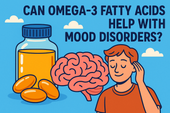
Can Omega-3 Fatty Acids Help with Mood Disorders?
Omega-3 fatty acids do more than support heart health — they can help balance mood, reduce depression, and calm anxiety. Discover how EPA and DHA nourish your brain, fight inflammation, and support emotional well-being from within. 🌊🧠
-

The Role of Magnesium in Reducing Irritability and Low Mood
Feeling on edge or emotionally drained? Magnesium could be the missing link between your body and your mood. Discover how this essential mineral reduces irritability, balances neurotransmitters, and helps your nervous system find calm again. 🌿✨
-
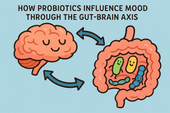
How Probiotics Influence Mood Through the Gut-Brain Axis
Discover how probiotics can do more than support your digestion—they can actually uplift your mood. This article explores the fascinating gut-brain axis and how balancing your gut bacteria through probiotics may help reduce anxiety, improve emotional stability, and support long-term mental well-being. 🌿🧠
-
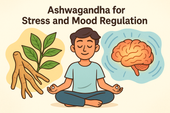
Ashwagandha for Stress and Mood Regulation
Discover how Ashwagandha, the powerful adaptogenic herb 🌿, helps your body manage stress and regulate mood. Learn how it balances cortisol, boosts GABA and serotonin, and supports emotional stability — helping you feel calm, focused, and resilient every day.
-
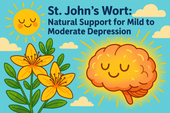
St. John’s Wort: Natural Support for Mild to Moderate Depression
Discover how St. John’s Wort, the “sunshine herb” 🌼, naturally supports mild to moderate depression. Learn how it boosts serotonin, balances mood, and promotes emotional resilience — with research showing its effectiveness compares to antidepressants, but with fewer side effects.
-
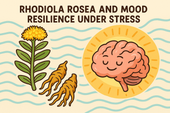
Rhodiola Rosea and Mood Resilience Under Stress
Discover how Rhodiola rosea helps your body adapt to stress 🌿. Learn how this powerful adaptogen balances cortisol, supports serotonin and dopamine, and strengthens emotional resilience — helping you stay calm, focused, and energized under pressure.
-

Chamomile and Lavender: Herbal Calm for Emotional Fluctuations
Discover how chamomile and lavender bring calm to emotional ups and downs 🌿. Learn how these two soothing herbs balance your nervous system, ease anxiety, and support restful sleep — naturally helping you find peace and emotional stability.
-
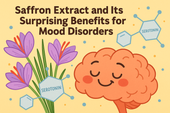
Saffron Extract and Its Surprising Benefits for Mood Disorders
Discover how saffron extract — the golden spice of joy 🌸 — can naturally support mood balance, ease anxiety, and lift mild depression. Learn what science says about its serotonin-boosting power, the ideal dosage, and how this ancient remedy compares to modern antidepressants.
-
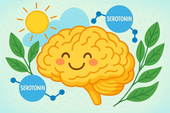
5-HTP and Serotonin: A Natural Path to Lifting Mood
Discover how 5-HTP naturally boosts serotonin 🌞 — the neurotransmitter behind mood, sleep, and emotional balance. Learn how this plant-derived compound supports happiness, reduces anxiety, and improves rest by helping your brain create more serotonin the gentle, natural way.
-
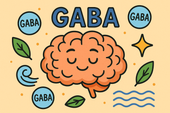
GABA Supplements for Reducing Anxiety and Mood Swings
Discover how GABA supplements can help reduce anxiety and balance mood naturally 🌿. Learn how this calming neurotransmitter works to quiet the mind, ease stress, and improve sleep — plus which nutrients and habits can boost your body’s own GABA production for long-term emotional stability.
-
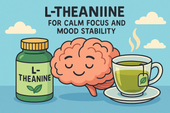
L-Theanine for Calm Focus and Mood Stability
Discover how L-theanine, the calming compound found in green tea 🍵, promotes focus, relaxation, and mood stability. Learn the science behind how it balances neurotransmitters, reduces stress hormones, and enhances clarity — helping you stay centered, calm, and productive without sedation.
-
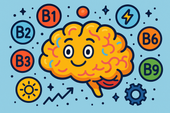
B Vitamins and Brain Chemistry: Supporting Energy and Emotional Balance
Discover how B vitamins power your brain chemistry ⚡. Learn how B6, B9, and B12 support serotonin, dopamine, and energy production — helping boost focus, mood, and emotional balance. From diet to supplements, explore how this vital nutrient group keeps your mind resilient and your energy steady.
-

N-Acetyl Cysteine (NAC) and Mood Disorders: What the Research Says
Learn how N-Acetyl Cysteine (NAC) supports brain health and mood balance 🧠. Discover how this antioxidant helps reduce oxidative stress, regulate glutamate, and improve emotional stability in depression, bipolar disorder, and anxiety — backed by cutting-edge psychiatric research.
-

Supplements for Bipolar Disorder: What May Support Stability
Discover the best supplements for bipolar disorder 🌿 that may support emotional stability and brain health. Learn how nutrients like omega-3s, magnesium, vitamin D, and NAC can help reduce inflammation, balance neurotransmitters, and complement traditional treatment safely.

















































